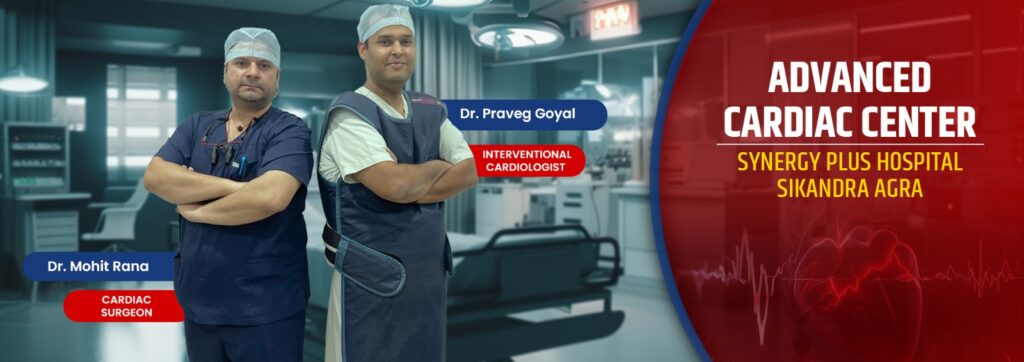Know your Heart Disease?
Heart attack occurs when the blood flow in the coronary artery is reduced or blocked.
Common symptoms of a heart attack include:
Chest pain or discomfort: This is the most common symptom and is often described as a feeling of pressure, squeezing, fullness, or pain in the chest. It may come and go or persist for several minutes.
Pain or discomfort in other upper body areas: The pain may spread to the arms (usually the left arm but can also affect the right arm), shoulders, neck, jaw, or back. It may feel like aching, numbness, or a tightness in these areas.
Shortness of breath: Difficulty breathing or feeling breathless, often accompanied by chest discomfort or tightness.
Sweating: Cold sweats, clammy skin, or perspiration unrelated to physical activity.
Nausea and vomiting: Some people experience a feeling of nausea or may vomit during a heart attack.
Lightheadedness or dizziness: Feeling dizzy, lightheaded, or faint may occur during a heart attack.
Fatigue: Unusual and extreme tiredness or a feeling of weakness, even without exertion.
Reducing the risk of developing heart disease involves adopting a healthy lifestyle and making certain changes to improve cardiovascular health. Here are some key strategies:
Maintain a healthy diet: Follow a balanced diet that is rich in fruits, vegetables, whole grains, lean proteins (such as fish, poultry, and legumes), and healthy fats (found in olive oil, avocados, nuts, and seeds). Limit the consumption of processed foods, sugary beverages, saturated and trans fats, and sodium.
Engage in regular physical activity: Aim for at least 150 minutes of moderate-intensity aerobic exercise or 75 minutes of vigorous exercise every week. Incorporate activities that elevate your heart rate and strengthen your muscles. Consult with a healthcare professional before starting any exercise program.
Control blood pressure: Monitor your blood pressure regularly and take steps to keep it within a healthy range. This may include adopting a low-sodium diet, engaging in regular physical activity, maintaining a healthy weight, limiting alcohol consumption, and following any prescribed medications or treatments.
Manage cholesterol levels: Keep your cholesterol levels in check by consuming a low-cholesterol diet, reducing saturated and trans fats, and avoiding excessive intake of processed and fried foods. If necessary, consult a healthcare professional about cholesterol-lowering medications.
Maintain a healthy weight: Strive for a healthy body weight by adopting a balanced diet and engaging in regular physical activity. Losing excess weight can significantly reduce the risk of heart disease.
Quit smoking: If you smoke, quit smoking as soon as possible. Smoking is a major risk factor for heart disease and quitting can improve your cardiovascular health. Seek support from healthcare professionals, smoking cessation programs, or support groups.
Limit alcohol consumption: Excessive alcohol consumption can increase the risk of heart disease. If you drink alcohol, do so in moderation, which means up to one drink per day for women and up to two drinks per day for men.
Manage stress: Find healthy ways to cope with stress, as chronic stress can contribute to heart disease. Practice relaxation techniques like deep breathing, meditation, yoga, or engaging in hobbies and activities that you enjoy.
Get regular check-ups: Schedule regular check-ups with your healthcare provider to monitor your blood pressure, cholesterol levels, and overall cardiovascular health. They can provide guidance specific to your individual risk factors.
Remember, it's important to consult with healthcare professionals for personalized advice and guidance based on your specific health profile and risk factors
Cardiac surgery has significantly improved safety due to advancements in technology and surgical techniques. While risks exist, such as infection, bleeding, blood clots, arrhythmias, and lung or kidney complications, they are generally managed well. Individual factors and the expertise of the surgical team influence safety. Thorough evaluation, discussion of potential complications, and choosing a reputable medical center are important for maximizing safety.
After cardiac surgery, individuals can gradually resume their normal life. Recovery time varies based on the surgery, overall health, and individual circumstances. There is an initial post-operative period of several weeks with specific instructions from the healthcare team. Over time, activity levels can increase, but strenuous activities may need to be avoided temporarily. Cardiac rehabilitation programs may be recommended. Following the healthcare team's guidance, attending check-ups, taking prescribed medications, and making necessary lifestyle changes are crucial for a successful recovery. Recovery timelines vary, so personalized advice from the healthcare team is important.








